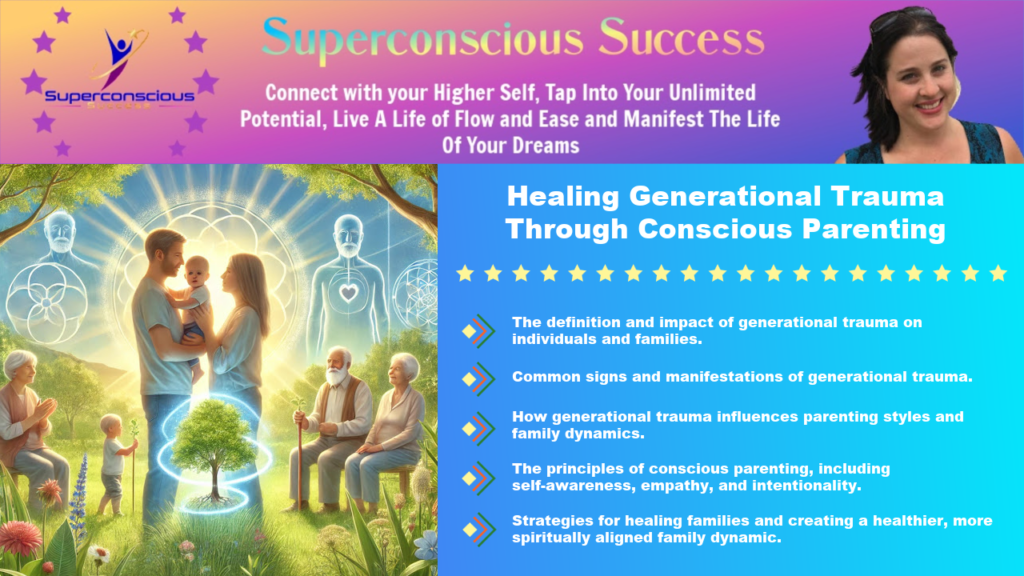
In this blog post, we’ll delve into the concept of generational trauma, exploring how it impacts individuals and families across generations. You’ll learn about the signs of generational trauma and its profound effects on family dynamics. We’ll also discuss the principles of conscious parenting, a transformative approach that can help in healing families by breaking negative cycles and fostering a nurturing environment. By the end of this article, you’ll have a deeper understanding of how to create a healthier, more spiritually aligned family dynamic, ensuring a positive legacy for future generations.
Page 1
Page 2
Additional Information
What is Generational Trauma?
Generational trauma, also known as intergenerational trauma, involves the emotional impact of past traumas passed down through families. Specifically, this trauma affects not just individuals but also future generations, creating a ripple effect that influences family dynamics over time. Recognizing these patterns is crucial for breaking these cycles, as it enables you to understand how past experiences shape present behaviors and relationships. By addressing these issues, you take significant steps toward healing both yourself and your family. Consequently, this process helps to foster a more harmonious and supportive family environment.
Signs and Impact of Generational Trauma
Generational trauma can show up in many ways, significantly impacting emotional and psychological well-being. This trauma often leaves a deep, lasting mark, affecting behaviors, relationships, and mental health across generations. Consequently, the signs of generational trauma are often complex and multifaceted, highlighting its profound and wide-reaching impact.
Common Signs:
Increased Anxiety and Depression
Individuals affected by generational trauma often experience heightened levels of anxiety and depression, which are frequently linked to unresolved trauma passed down from previous generations. Consequently, this unresolved trauma can manifest as pervasive feelings of fear, sadness, and hopelessness.
Moreover, the emotional baggage carried from past generations can intensify these feelings, making it challenging to cope with everyday stressors. As a result, individuals may find themselves caught in a cycle of emotional distress that further exacerbates their mental health struggles. Understanding this connection is crucial for addressing the root causes of anxiety and depression, leading to more effective and compassionate approaches to healing.
Difficulties Forming Healthy Relationships
Trauma can significantly disrupt the ability to form and maintain healthy relationships. Specifically, individuals affected by trauma often struggle with issues related to trust, intimacy, and communication. Consequently, these difficulties can have a profound impact on their ability to build and sustain meaningful connections with others.
Moreover, the emotional wounds from trauma can create barriers that prevent genuine engagement and understanding in relationships. As a result, individuals may find themselves isolated or unable to fully connect with those around them. Recognizing and addressing these challenges is essential for improving relational dynamics and fostering healthier, more supportive interactions. By working through these issues, individuals can begin to rebuild trust, enhance communication, and cultivate deeper, more fulfilling relationships.
Dysfunctional Behaviors
Recurring dysfunctional behaviors, such as substance abuse, self-destructive tendencies, or emotional unavailability, are common in families with a trauma history. These behaviors often act as coping mechanisms for unresolved trauma, helping individuals manage their emotional pain. Consequently, they perpetuate the cycle of dysfunction within the family.
Chronic Stress and Hypervigilance
Individuals may display signs of chronic stress and hypervigilance, including an exaggerated startle response, difficulty relaxing, and a persistent sense of threat. As a result, this heightened state of alertness can significantly affect overall well-being and daily functioning.
Furthermore, these symptoms often create a continuous cycle of stress and anxiety, making it challenging to manage daily responsibilities and maintain emotional stability. Consequently, this constant state of heightened alertness can interfere with various aspects of life, from personal relationships to professional performance. Recognizing and addressing these signs is crucial for improving quality of life and achieving a sense of balance and calm.
Persistent Sense of Doom
A pervasive sense of doom or the feeling that something bad is always imminent may signal unresolved generational trauma. This ongoing sense of impending disaster can significantly impact mental health and emotional stability.
Moreover, the constant anticipation of negative outcomes can lead to heightened anxiety and stress, further affecting overall well-being. Recognizing this pattern is essential for addressing the root causes of these feelings and working towards emotional healing and stability. By confronting and resolving these deep-seated issues, individuals can begin to alleviate the persistent fear and improve their emotional resilience.
Impact on Parenting and Family Dynamics
Generational trauma deeply impacts family dynamics, creating a cycle of dysfunction across generations. This trauma shapes how family members interact and influences the overall family environment. Understanding these patterns helps reveal how trauma affects relationships and family life. Recognizing and addressing these issues can lead to healing and improved family relationships.
Effects on Parenting:
Overprotectiveness:Parents influenced by generational trauma may become overprotective, trying to shield their children from perceived threats. Although intended to keep them safe, this can restrict their growth, independence, and ability to handle challenges.
Emotional Detachment: Trauma can lead to emotional detachment, where parents struggle to connect with their children’s needs and emotions. This detachment can hinder the development of a secure and nurturing parent-child relationship.
Inconsistent Discipline: Inconsistent or harsh discipline practices may arise from unresolved trauma, leading to confusion and insecurity in children. These inconsistencies can affect children’s understanding of boundaries and expectations.
Communication Barriers: Generational trauma can create barriers to effective communication within families. Misunderstandings and unresolved conflicts can lead to isolation and a lack of emotional connection among family members.
Continue Reading (Page 2)
Principles of Conscious Parenting
Conscious parenting is a transformative approach that emphasizes self-awareness, empathy, and intentionality throughout your parenting journey. At its core, it’s about being fully present and mindful of your actions and reactions. This approach seeks to break negative cycles and nurture your children in a healthier, more supportive way.
Self-Awareness
Self-awareness is a foundational principle of conscious parenting. It involves understanding your own emotions, triggers, and patterns of behavior. By being aware of how your past experiences and unresolved issues affect your parenting, you can make more intentional choices. This awareness helps you respond thoughtfully rather than react impulsively. For example, if you recognize that stress or fatigue influences your temper, you can take proactive steps to manage these feelings before they affect your interactions with your child.
Empathy
Empathy is another crucial aspect of conscious parenting. It means tuning into your child’s emotions and experiences with compassion and understanding. Instead of dismissing or minimizing their feelings, you acknowledge and validate them. This empathetic approach fosters a deeper connection and helps your child feel heard and supported. For instance, if your child is upset about a minor issue, empathizing with their emotions—rather than offering quick fixes—demonstrates respect for their feelings and supports their emotional development.
Intentionality
Intentionality in parenting means making deliberate and thoughtful choices in how you interact with your child. It involves setting clear goals for your parenting and aligning your actions with these objectives. Whether it’s fostering open communication, encouraging independence, or modeling positive behavior, intentionality ensures that your parenting practices are consistent and purposeful. For example, if your goal is to promote resilience, you might intentionally give your child opportunities to face challenges and learn from their experiences rather than shielding them from difficulties.
Mindfulness
Mindfulness is central to conscious parenting. It involves being fully present in the moment and aware of your interactions with your child. This practice helps you listen more attentively and respond more effectively. By staying mindful, you can better manage stress, remain calm during challenging situations, and create a more peaceful and supportive environment for your child. For instance, practicing mindful breathing or meditation can help you maintain a calm demeanor, which in turn benefits your interactions with your child.
Breaking Negative Cycles
Conscious parenting focuses on breaking negative cycles from your own upbringing or past experiences. Recognizing and addressing these patterns is key to preventing them from affecting your child’s development. By consciously choosing different behaviors and responses, you can create a healthier family dynamic. For example, if you were raised in an environment where emotional expression was discouraged, consciously practicing open communication and validating your child’s feelings can help break that cycle.
Nurturing a Healthy Environment
Nurturing a healthy environment involves creating a supportive and loving atmosphere where your child can thrive. This includes fostering positive relationships, setting healthy boundaries, and encouraging your child’s growth and independence. By being intentional about the environment you create, you support your child’s emotional and psychological well-being. For instance, setting aside regular time for family activities and creating spaces for open discussions can strengthen family bonds and promote a sense of security.
In summary, conscious parenting is a holistic approach combining self-awareness, empathy, intentionality, and mindfulness. By applying these principles, you nurture your child’s emotional and psychological growth while fostering a harmonious family dynamic.
Creating a Healthier and More Spiritually Aligned Family Dynamic
Healing generational trauma is a powerful step toward a healthier, spiritually aligned family dynamic. By actively engaging in this process, you not only open the door to deeper connections with your loved ones but also foster unity and mutual understanding. Consequently, this effort improves emotional and mental well-being, gradually transforming your home into a sanctuary of peace, love, and support.
One key benefit of healing generational trauma is improved mental health. As old wounds are addressed, anxiety, depression, and stress begin to lift. As a result, this creates space for healthier emotional expression and better communication. For instance, children feel more secure and valued, which, in turn, helps them thrive both within the family and in the wider world.
Moreover, the ripple effect of healing extends beyond your immediate family. By practicing conscious parenting and emotional intelligence, you influence not only your extended family but also the broader community. Thus, you become a source of inspiration and guidance for others facing similar issues. Your personal changes encourage others to reflect on their own experiences and start their healing journeys, ultimately contributing to a culture of mindfulness, compassion, and resilience.
Conscious parenting practices are central to this transformation. By being mindful of your actions, you create a parenting style rooted in empathy and self-awareness. As a result, this approach breaks the cycle of generational trauma and sets a powerful example for your children. Consequently, they learn emotional intelligence and compassion, which equips them to handle life’s challenges more effectively.
Furthermore, this journey of healing nurtures your children in ways that meet their immediate needs and prepare them for emotionally fulfilling lives. By building a legacy of love and resilience, you contribute to a more compassionate and emotionally intelligent society. Ultimately, creating a healthier, spiritually aligned family dynamic involves not only breaking free from the past but also building a future based on love, understanding, and mutual respect. This legacy empowers your children, strengthens family bonds, and inspires others to join the journey toward a more mindful and connected way of living.
Explore our Offers
Explore our podcast episodes on spirituality and personal growth, and join our FREE TUWC Family Membership for exclusive content and connections. Visit our About Page to learn more about Super Conscious Success. We’re excited to introduce our sister sites, each focused on different aspects of holistic wellness. The Self Empowered Empath supports empaths with emotional and mental health, Ask Naturopath Jen offers physical health and holistic wellness tips, and Tri-Unity Wellness Collective provides personalized coaching. Plus, explore TUWC Academy for diverse courses across five mini academies, including spiritual health, emotional wellness, physical health, conscious parenting, and spiritual entrepreneurship.
Additional Posts/Resources
The Spiritual Foundations of Conscious Parenting(Opens in a new browser tab)
The Role of Shadow Work in Healing Trauma(Opens in a new browser tab)
Generational Trauma Healing Guide
Unlock the path to healing generational trauma and embrace conscious parenting with our “Generational Trauma Healing Guide: A 5-Step Plan for Conscious Parents.” This comprehensive guide offers practical steps, worksheets, and reflection exercises to help you create a nurturing environment and break the cycle of trauma in your family. Download now and start your journey towards a healthier, more connected family life.

















